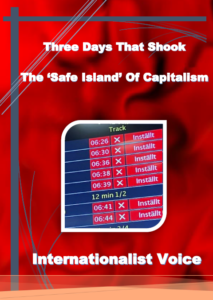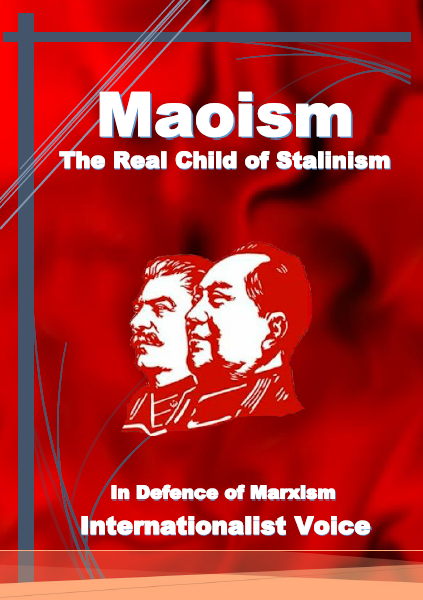Three Days that Shook the ‘Safe Island’ of Capitalism
The waves of labour protests and strikes that started last year have now spread to Scandinavia, known as a welfare state and as a ‘safe island’ capitalist paradise. For decades, there has been no sign of serious class conflict in Scandinavia. However, the recent rise of protests illustrates the global nature of the working class reaction to bourgeoisie attacks, as workers no longer tolerate every attack with humiliation and despair. The working class is raising its head all over the world.
Recent months have seen strikes by transport workers in Finland, which affected 10 major ports and hit the wood and paper industries, and a rail strike in Helsinki.[1]
In Norway last week, tens of thousands of workers were on strike to campaign for a real-term pay rise.[2] Although organized through unions, it is historically significant as it is the first major strike in 20 years and the first time since World War II that central wage negotiations have led to conflict.[3]
However, the most important strike in Scandinavia happened in Sweden. In 2021, the Stockholm Traffic Committee decided to replace train guards with video cameras from 1st March 2023. Train drivers argued that digitalization and automation does not just mean installing cameras, and that doing so endangers the safety of drivers and passengers. They were adamant that the train company, politicians and the trade union should know that they will not accept the removal of key safety features.
On 14th April, drivers of suburban trains decided to call a wildcat strike,[4] demanding the return of the train guards and safe duties. The strikers stated that they were defending their own safety and that of their passengers.
The Union for Service and Communications Employees (SEKO) found out about the wildcat strike but advised their members to show up for work, declaring the strike to be illegal. If unions are organization of the working class, why are wildcat strikes taking place? Why do workers leave their union? These false defenders of workers’ rights issued the following statement:
‘We have noted that an illegal strike is being planned and called for on the commuter trains in Stockholm. We assume that all our members will go to work.’[5]
The SEKO also stated that it considered the organization of any illegal and wildcat strikes to be harmful to current negotiations:
‘We are currently negotiating a new collective agreement for our members in the rail transport industry, which also includes our members in public transport in Stockholm. In the negotiations, we pursue important issues to improve the conditions and working environment for our members. In that situation, organizing illegal and wild strikes hardly makes it easier to negotiate.’[6]
Undeterred, the train drivers formed a strike committee, announced a three-day wildcat strike beginning at 3am on 17th April and set up a picket outside the central railway station. About 80% of drivers participated, with only those on probation, plus union representatives and activists, refusing. The position of drivers on probation is understandable because they would have been sacked, but if the unions are workers’ organization, the union representatives and activists should have been in the front line of the picket. As a result of the strike, about 80% of suburban trains were cancelled.
There was incredible solidarity among the train drivers but also a lot of public support for the strike because it was about safety rather than about pay. Passengers understood the demands and concerns of the drivers. Recent protests in France also influenced public opinion, with the feeling that ‘a little more like France is needed’. Public discourse also indicated support for the wildcat nature of the strikes, as seen by these example comments:
- ‘Wild strikes pay off!’
- ‘Long live the wild strike! What an inspiration!’
- ‘All power to the workers on our trains! I think the strike has potential precisely because it is wild.’[7]
A strike fund was formed to support the drivers, raising about 1.5 million krona in in three days. Drivers have stated that the money will primarily be used to pay damages and labour court costs, as they expect the court will punish them for taking a wildcat strike.
The train company (MTR), which has the support of the majority of the Stockholm regional council (the Social Democrats, the Green Party and the Centre Party (Farmers)), filed a court complaint against the drivers and demanded their immediate return to work. Claiming twice the usual damages. It believes that the standardized amount for strike damages of 3,000 krona per person per occasion is insufficient.[8] It claims that the value of money has increased since the standard was set and that the employers’ organization recommended they ask for 6,000 krona per person per occasion.[9] Since it became clear that the train drivers would go on a wildcat strike, MTR has resorted to various threats to break it, including damage claims, dismissals and complaints to the labour court. These threats were impotent and did not deter the strikers.
The regional councillor responsible for traffic, who is a member of the Green Party, launched a violent attack against the striking workers, accusing them of extortion and ‘holding passengers hostage’. This attack was extended to democratic and civil officials, who were accused of sabotaging democratic decisions. Mr. Matthias Dahl, Vice President of the Confederation of Swedish Enterprise, which is very democrat and civilized person, was against the ‘sabotage’ perpetrated by the workers, saying:
‘The behaviour is and should be punishable. It should not be possible to sabotage democratically made decisions… Wildcat strikes are very unusual in Sweden… Wildcat strikes mean strikes without union approval. It is illegal industrial action. According to the co-determination act, MBL, the union must then contribute to the end of the strike.’[10]
SEKO distanced itself from the strike. Mr Dahl declared the unions to be the pride of Swedish industry and expressed his clear opposition to general labour assemblies under the title of ‘street parliament’:
‘It honours the union that they stand up for the rules on the Swedish labour market and the Swedish labour market model. We parties find solutions through negotiations, not by going against democratic decisions…The labour court can sentence the strikers to pay damages, and they also risk dismissal… Wild strikes are very unusual in Sweden. We must be afraid of the social cohesion that our democracy and our labour market model are an express-ion of…We must not have a ‘street parliament’ in Sweden.’[11]
MTR press director Erik Söderberg reported that they had held a positive meeting with the union and see them as an important partner in negotiations. One of the local union officials declared his opposition to the wildcat strike and emphasized that all negotiations and actions should be conducted within the framework of the union. He stated that:
‘He had zero sympathy with wildcat strikes, that he has been local union president for six years and believes in negotiation and industrial action within the framework of union regulations.’
However, contrary to the statements of the Swedish authorities, union activists and officials, the comments and opinions of the public revealed a level of anger, opposition and hatred towards the union:
- ‘Cheers to the train drivers and shame on the union for not doing what you are there for!’
- ‘Now we hope for more wild strikes, when the unions are too cowardly.’
- ‘Cheers to the train drivers and don’t give up! Continue to fight! No use for the union!’
- ‘The unions in Sweden have lost their edge. It feels redundant to be in the union when they do nothing.’
- ‘Good finger-pointing at the SEKO (union) and other unions. You haven’t done your job! If you do not represent those who work, you have no right to exist.’[12]
Unions not only present disorder in the workers’ struggle, but if the situation requires it, they also appear in the role of police in the workplace. In an example from the UK, i.e., in the democratic world, not a dictatorship, staff from the largest union, Unite, created a blacklist of workers whom they found to hold politically inappropriate view, which they provided to employers to prevent these workers from being hired, thereby ensuring the security of production and industry.[13]
The Swedish bourgeoisie wanted to force workers to accept unsafe working conditions by resorting to the argument of ‘democratic decision-making by democratic politicians’, which it emphasized on every occasion. The significance of this three-day wildcat strike is that the workers not only sacrificed themselves to defend democracy, but also challenged that democratic decision. This is very challenging for both the Swedish bourgeoisie and the trade unions. This three-day wildcat strike was a thorn in the eyes of the Unions, so it is likely that the unions will promote pre-organized strikes in the near future and speak in radical language to be accepted by the workers. By presenting this radical image of themselves, the unions will be able to channel the latent anger of the workers in a way that ultimately leads to the defeat of the working class.
These are the same unions that implementing the most anti-labour policies against the working class in Western countries, even blacklisting protesting workers but the left of capital equates the “paper solidarity” of the bosses of unions with the class solidarity of workers in Europe with the working class of peripheral capitalist countries. Paper solidarity prevents the working-class battalions of the world class from realizing their real, factual class solidarity.
The train drivers were heroic, engaging in a historic wildcat strike that shook the ‘safe island’ capitalist paradise for three days. However, the strike also had a serious weakness. Even though there was strong support from the public, the drivers did not refer to their class sisters and brothers, did not extend the strike to other sectors and decided from the beginning that it would only last three days.
Comments from others such as ‘we should all go on a sympathy strike’ and ‘we travellers should also strike and support the train drivers’ were important. We can only impose our demands on the bourgeoisie by extending the struggle to other industries and by gaining the solidarity of our class sisters and brothers.
As long as there is wage slavery, there is capitalism. Hell on earth is waiting for our class, for wage slaves. Class struggle is the only answer and horizon that is ahead of our class. The bourgeoisie fears the spectre of the class struggle more than anything, because it will lead to the revolutionary destruction of the capitalist system in its evolutionary process. This barbaric and dirty capitalist system must be brought down.
The future belongs to the class struggle!
Internationalist Voice
24 April 2023
Notes:
[4] Wild strikes were common in Sweden in the 1970s, with about 300 wild strikes in 1975, but since 1991 they have been rare.
[5] The Union for Service and Communications Employees
[6] As above
[8] In 2018, the labour court declared the rubbish collectors’ wildcat strike of the summer of 2017 to be illegal and forced them to pay between 2,500 and 3,500 krona each in fines.
[9] For example, if a driver works two shifts during the three days of the strike, he or she must pay 12,000 krona in damages.
[10] The Confederation of Swedish Enterprise
[11] As source 10
[12] As source 7
[13] Officials of the union Unite compiled a blacklist of more than 3,200 workers, in conjunction with 40 companies. Officials of the union divided the workers on their blacklist into three groups: “militant”, “troublemaker” and with a warning to be “careful”. The result of the blacklist was that many of the workers were left idle for a long time. Long-term unemployment has led to painful problems for these workers in the democratic country of the UK. The Guardian report can be read in the link below:














